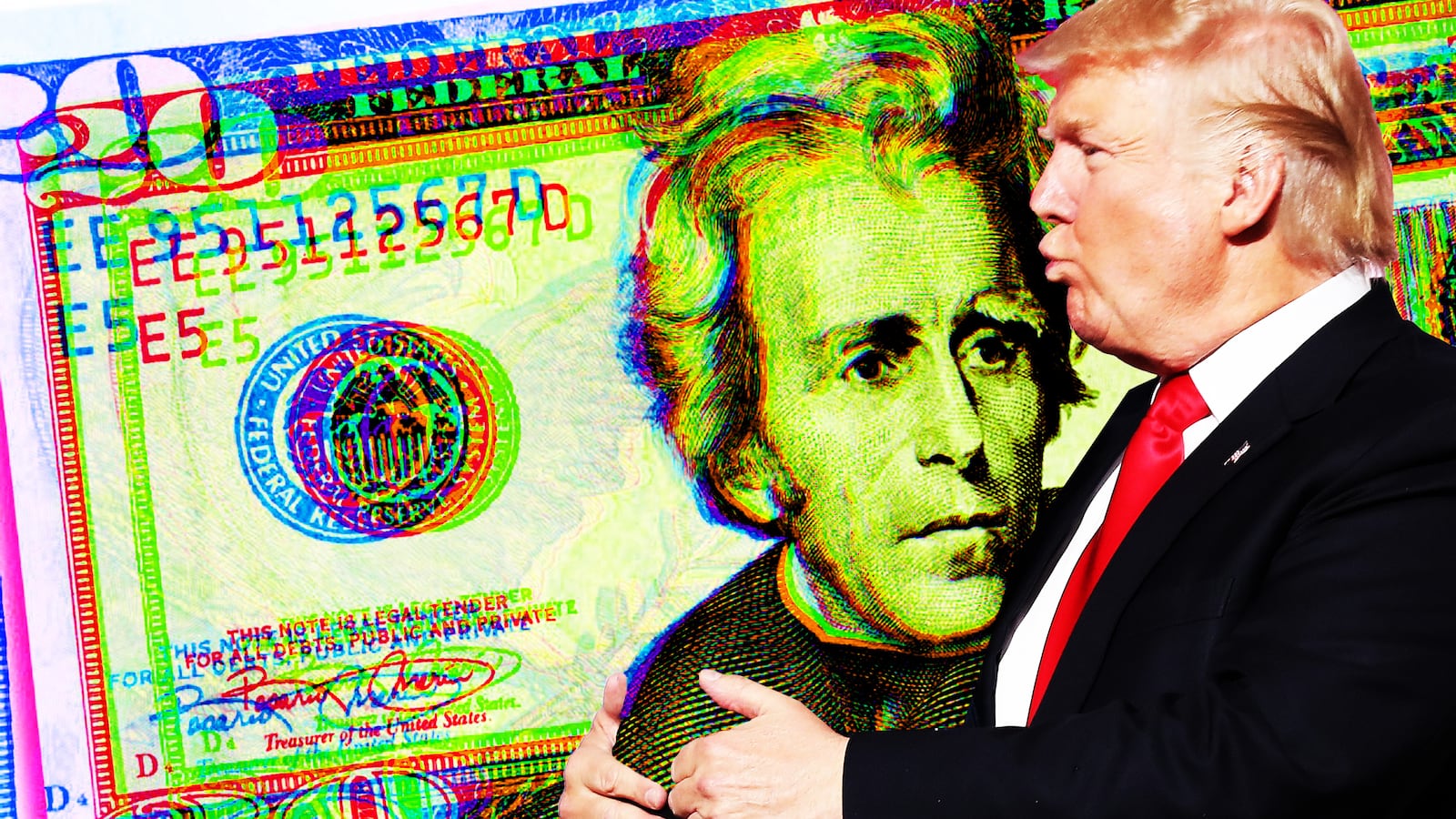Earlier this week, to almost no one’s surprise, Treasury Secretary Steve Mnuchin announced that the Harriet Tubman $20 bill would be delayed until President Donald Trump leaves office. So if anyone wanted to know who’s to blame for Tubman’s absence and Andrew Jackson’s offensive presence on our greenbacks, Mnuchin clearly wants you to know it’s the guy throwing temper tantrums in the Oval Office.
I have no idea what Mnuchin’s opinion is on the Tubman situation because he always dodges the question, but honestly Mnuchin’s opinion never mattered. Trump has such a long history of racist statements and praising Andrew Jackson that we all expected him to never let Tubman appear on our currency—and especially not at the expense of his idol Jackson.
Trump has been known to not want black accountants for his businesses because he did not want “black people handling his money,” instead preferring “guys with yarmulkes.” So if he despised the idea of black people touching his money, just think about how enraged he would become if black people were on his money.
Also, Mnuchin does not normally wear a yarmulke, but since America has a president who prefers to reduce people to racist tropes and stereotypes, none of us should be surprised that Trump appears to have transferred the accounting practices of his businesses to the Treasury.
Trump’s attempts at subtle racism grow less subtle by the day, and his continued defense of Jackson should concern all Americans. Not only was Jackson an unabashed racist, but he notoriously flouted the law to implement his racist terror. However, following his presidency, conservative Southerners waged a whitewashing spin campaign to elevate Jackson to hero status and minimize his genocidal lawlessness.
During his presidency Jackson sought to expand American territory, and to him this also meant the removal of indigenous people. In Georgia, white settlers had begun invading, attacking, and claiming the indigenous lands of the Cherokee people as their own. Jackson responded to this problem by advocating for the forced removal of the Cherokee people to lands west of the Mississippi, over 1,000 miles away. One of Jackson’s first acts as president was signing the “Indian Removal Act” in 1830.
Jackson, like countless Americans at the time, depicted indigenous people as uncivilized savages, rapists, and murders, and defended the implied right of white people to terrorize Native Americans. And to Jackson’s surprise the Cherokee Nation that he constantly demonized had actually learned American customs and laws, and challenged the legality of the Indian Removal Act. In 1832, the Supreme Court in Worcester v. Georgia ruled in favor of the Cherokee Nation, stopping Jackson’s genocidal agenda.
Jackson, like Trump, was undeterred by the court’s ruling, and spent years trying to circumvent the law to remove these indigenous people. Jackson later noted that if no one intended to enforce the court’s rulings then the decisions would be “still born” and lifeless.
In 1836, Jackson expelled the Creek Indians from their lands in Tennessee, Georgia, and Alabama, and over 20 percent of the population died during their forced deportation.
And in the previous year, in 1835, Jackson convinced a small segment of the Cherokee Nation that had grown tired of the constant attacks from white settlers and wanted to leave to sign a treaty agreeing to their forced removal.
Since this faction did not speak for the Cherokee people, the Cherokee Nation challenged the legality of the treaty, but Jackson and his successor President Martin van Buren disregarded their actions. In the summer of 1838, the U.S. military invaded Cherokee lands and commenced the forced genocidal march that became known as the Trail of Tears.
Thousands of Cherokees died on this forced march, yet even today Jackson’s brutality and lawlessness is downplayed, and this is largely due to the South’s efforts to elevate the first Southern president not from Virginia.
From the onset of the Civil War, Jackson became the new face of Southern pride—despite having passed away in 1845, nearly 20 years before the war started. Following the South’s defeat, the movement of the Lost Cause that worked to repair the image of Confederate soldiers absorbed Jackson into their propaganda campaign. Robert E. Lee and Jefferson Davis became heroes with statues across the South, and the Lost Cause downplayed the significance of slavery as the cause of the war. Likewise Jackson became the national face of the South—since it would be absurd to have Confederate traitors on our currency—and the horrors and lawlessness of the Trail of Tears have been largely overlooked and forgotten.
Lost Cause propagandists aren’t afraid to play the long game to exploit American’s forgetfulness and seize an opportunity to repaint America in their favor. Jackson didn’t appear on the $10 bill until 1914, 69 years after his death and 77 years after his presidency. And in 1928 Jackson finally appeared on the $20 bill, 83 years after his death and 91 years after his presidency.
The decision to place Tubman on the $20 bill represented an ideological shift in the American narrative where facts would now matter more than Southern propagated fiction, and the lives of authentic African-American heroes would finally have the representation they deserve.
But, as Trump has embodied the Lost Cause movement—by orchestrating the rise of “fake news,” executive branch lawlessness, defending racist language, implementing racist policies, and turning a blind eye to the increased threats that minority communities face—it is obvious that Tubman embodied the complete antithesis of his presidency and eventual legacy. Her story is one he never wants told.
Trump has no long-term plan for our currency apart from keeping Tubman off of it, but do not be surprised if he or his supporters (who have taken Southern ideals national) attempt to go full-Jackson and work to have his face on our currency. They’ll probably be called “goldbacks” in honor Trump’s tacky, gold-encrusted facade, which instead will be depicted as a sign of a wealth that he in real life inherited and cheated to amass.
Southern propagandists and white racists play the long game to rewrite American history, so the voices who champion truth and racial equality must remain vigilant. Otherwise we’ll never see any Tubman, or Barack Obama, dollars, and may instead find ourselves awash in Jackson $20 bills and gold-encrusted Trump bucks.




